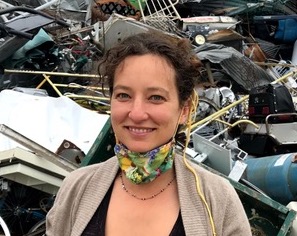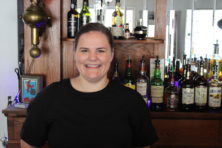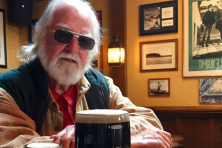Peninsula Poetry: Alessandra Simmons
- Share
- Tweet
- Pin
- Share
Compiled by the Door County Poets Collective

Originally from Los Angeles, Alessandra Simmons moved to the Midwest to pursue an MFA in creative writing at Indiana University. After graduating, she married Russell Rolffs and moved north to Chicago. Later, she continued her trek north to study at UW-Milwaukee, earning a PhD in English/creative writing while working with poet Kimberly Blaeser in 2020.
Simmons has served as editor-in-chief of Indiana Review and poetry editor of Cream City Review and has taught English composition and creative writing at several universities. Her poems have been published in Spillway, Smartish Pace, Rewilding: Poems for the Environment and other anthologies and literary journals.
In 2016, Simmons and Rolffs journeyed north again for a summer adventure on Washington Island – to start a garden for Hotel Washington and work at the Art and Nature Center. Little did they know that life on the island would suit them, and after two years of back and forth between Milwaukee and Washington Island, they moved to the island full time.
They now own Hoot Blossom Farm, where they grow organic veggies, cut flowers and wildflowers. Simmons also helped to found Gathering Ground, a nonprofit whose 40 acres include vineyards, orchards, gardens, a community compost program, fields and woods. As its first executive director, she helps to run its educational internship for young people who are interested in regenerative agriculture, conservation and environmentalism, as well as programs and experiences for all ages, including Gathering Ground’s annual Dinner in the Vineyard: a celebration of local food and drink.
What’s your writing routine?
Being at home 24/7 with a toddler has destroyed any chance of a writing routine, so I write during snatches of moments here and there. In other phases of my life, I wrote in the mornings before being bombarded with too much noise, and I often revised poems in the evenings.
What do poorly written poems have in common?
They often rely on overly familiar or clichéd language and evoke sentimentality rather than sentiment.
What do most well-written poems have in common?
Stunning poems contain striking language with images, metaphors and music that make you want to pause and reread it.
Is it important to understand the meaning of a poem or for the reader to be able to “solve” it?
I like to think of poems as experiences rather than puzzles. Poems often try to put the ineffable into words, which is a nearly impossible task. As I read a poem, I track my emotional as well as intellectual response. When a poem requires rereading, it is often trying to convey a nuanced and challenging subject that requires my full attention.
What book are you reading right now?
I am almost finished with Ecology of a Cracker Childhood by Janisse Ray, and I’m excited to start Begin Again: James Baldwin’s America and Its Urgent Lessons for Our Own by Eddie Glaude.
Family Portrait on a Farm (1933)
A blur-faced son looks away, while his brothers hold
our gaze. Their light eyes ghost in this old photograph.
What did they want us to see? A field and its workers.
A mother, thin-lipped, worn and sun-spent as her sons’
clothes. What we are allowed to catalogue — how they
ploughed the acres and slopped the pigs. Seeded
and cut down. Threshed and slaughtered. Of the mother
we only allow for dishes washed, water carried, laundry
hung, coffee poured. But what of her mineral body
given and given and given. Ten sons and daughters
and three in the cemetery. Wheat poured through
a living thresher, calcium, phosphorus, potassium.
Portrait of a Woman (1898)
The woman in a dress and petticoats, leaning forward
on her wooden chair, notebook on lap. Listening
through the propped-open door of the lecture hall. Careful
not to cross the threshold, careful not to cross her legs. To expose
her leather boot or her ankle. The professor
didn’t have to leave his door open, but did so. She will graduate
with a degree in eavesdropping — what does a farmer’s wife
or a grammar school teacher need to know about light
and matter and their movement. The winter drafts, sudden gusts
in the hallway insist she keeps her coat on. In the classroom, men raise
their hands. She tracks mice hurrying down the edge of the hall. She scatters
crumbs from her lunch when she is feeling generous.
New Mother Poem [Honey Locust]
If I were a honey locust
you’d be my seed pod
your little round body
bound by sweet pulp
and leather skin. When student
protesters are struck
by trucks and flares
of the national guard
their blood will wet
the sidewalks, their young
hands will not sculpt
or write or clap. But
you, my little legume, when
your pod is crushed
in the street and power
hoses wash away litter
and crowds, you will float along
until you bloat with water
and sun until you find a crevice
or a spot of trampled earth
and you will sprout and hold
your compound leaves in the air.
Maiden Name
When I marry, I lose half the syllables
in my last name — a decision to sell
the dining table in a yard sale
because of who it reminds me of and not
because it isn’t sturdy. Unmoored
my signature sinks below the line
on my grocery store receipts
and cuts the paper dolls holding hands
at the wrist. None of us knew the West
Virginia tobacco farmer whose name
we’ve practiced. We hardly know each other,
but when I had all my syllables we appeared
like sisters. You can see we all have the same
square hands, are missing the same teeth.
I crowd documents with various combinations —
the given, sold, and stolen names — as if lifted
from the shelves of an airport gift shop.
Peninsula Poetry is a monthly column curated by the Door County Poets Collective, a 12-member working group that was formed to publish Soundings: Door County in Poetry (Caravaggio Press, 2015) and continues to meet.


